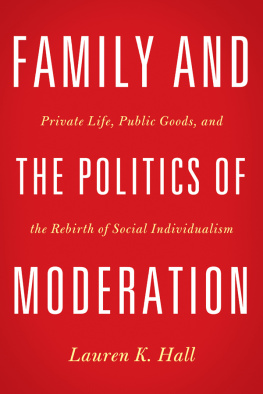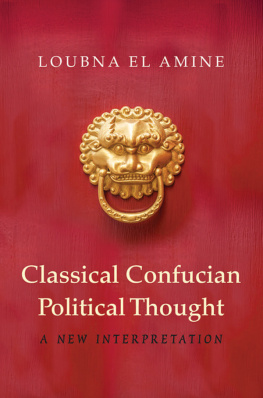A Virtue for Courageous Minds
A Virtue for Courageous Minds
Moderation in French Political Thought, 17481830
AURELIAN CRAIUTU
PRINCETON UNIVERSITY PRESS
PRINCETON AND OXFORD
Copyright 2012 by Princeton University Press
Published by Princeton University Press, 41 William Street,
Princeton, New Jersey 08540
In the United Kingdom: Princeton University Press, 6 oxford Street,
Woodstock, Oxfordshire OX20 1TW
press.princeton.edu
Jacket art: Simon Vouet (15901649). Allegory of Peace, ca. 1640. Photo credit: Erich Lessing / Art Resource, NY.
All Rights Reserved
Library of Congress Cataloging-in-Publication Data
Craiutu, Aurelian.
A virtue for courageous minds : moderation in French political thought, 1748-1830 / Aurelian Craiutu.
p. cm.
Includes index.
ISBN 978-0-691-14676-8 (cloth : alk. paper) 1. Political scienceFranceHistory18th century. 2. Political scienceFranceHistory19th century. 3. ModerationPolitical aspectsFranceHistory. 4. FrancePolitics and governmentPhilosophyHistory. I. Title.
JA84.F8C72 2012
320.094409034dc23 2011040355
British Library Cataloging-in-Publication Data is available
This book has been composed in Sabon LT Std
Printed on acid-free paper
Printed in the United States of America
10 9 8 7 6 5 4 3 2 1
Il ne faut pas toujours tellement puiser un sujet, quon ne laisse rien faire au lecteur. Il ne sagit pas de faire lire, mais de faire penser.
Montesquieu
This virtue of moderation (which time and situations will clearly distinguish from the counterfeits of pusillanimity and indecision) is the virtue only of superior minds. It requires a deep courage, and full of reflection, to be temperate when the voice of multitudes (the specious mimic of fame and reputation) passes judgment against you.
Burke
For Sophia Alexandra
Contents
The Architecture of Moderate Government:
Montesquieus Science of the Legislator
Moderation and the Intertwining of Powers:
Jacques Neckers Constitutionalism
Acknowledgments
This book has been a long time in the making. I started thinking about it some twelve years ago while finishing my dissertation on the French doctrinaires whose juste milieu was a good example of political moderation. The final chapter of my thesis contained a brief reflection on the moderation of Guizot, Royer-Collard, and their fellow doctrinaires. In 2000, I wrote a long review-essay on the virtues of political moderation, which was published in Political Theory a year later. In 2002, I taught a graduate course on moderation and radicalism at Indiana University, Bloomington, and three years later, I wrote an essay about Tocquevilles paradoxical moderation that came out in The Review of Politics. In 2006, I published a book in Romanian, Elogiul modera iei (In Praise of Moderation), which set the stage for the present volume. While A Virtue for Courageous Minds is on some level the continuation and the refinement of my previous reflections on moderation, it has an entirely different focus, exploring several faces of political moderation in modern French political thought from 1748 to 1830.
iei (In Praise of Moderation), which set the stage for the present volume. While A Virtue for Courageous Minds is on some level the continuation and the refinement of my previous reflections on moderation, it has an entirely different focus, exploring several faces of political moderation in modern French political thought from 1748 to 1830.
The research for this volume has been made possible by the generous financial support of several institutions to which I would like to express my deepest gratitude: my home institution, Indiana University, Bloomington; the Earhart Foundation (which offered me two summer research grants in 2004 and 2005); the American Council of Learned Societies, the Institute for Advanced Study in Princeton (which awarded me fellowships at a key moment in the completion of this project in 20082009); and the Social Philosophy and Policy Center at Bowling Green University (which hosted me as a fellow during the Fall 2005 semester). Also, special thanks to the Liberty Fund, which invited me to direct two academic colloquia on the political thought of Mme de Stal and Benjamin Constant (in 2004 and 2006) and published the English edition of Mme de Stals Considerations on the Principle Events of the French Revolution (2008).
Over the past decade, I have been invited to present parts of this book in various academic settings in the United States, France, and Romania, and I am grateful to all those who provided valuable suggestions and criticism. Vladimir Protopopescu read the entire manuscript with a sharp eye, encouraging me to reconsider many claims and arguments. As always, Jeremy Jennings and Daniel Mahoney have generously shared with me their knowledge of modern French thought and commented on previous drafts of this book. Over the past decade and a half, I have learned a great deal from Lucien Jaumes writings on modern French thought which have opened up new directions for my research. Costica Bradatan has been an invaluable intellectual companion and friend with whom I have been in constant dialogue over the past years. While spending a year as Fellow at the Institute of Advanced Study in Princeton, I had the opportunity to discuss the virtues and limitations of moderation with Jonathan Israel and Melvin Richter, who challenged me to explore new conceptual and methodological vistas. The same can be said of Joel Olson, who has been working to rescue from oblivion the positive aspects of fanaticism. I am also grateful to Philippe Raynaud, Denis Baranger, and the Institute Michel Villey for the invitation to spend a month as Visiting Professor at the University of Paris II, Panthon-Assas (May 2010), where I gave two lectures on Mme de Stal and Constant. The Interlibrary Loan Department at Indiana University, Bloomington, the HS-SS Library at the Institute for Advanced Study in Princeton, and the Social Philosophy and Policy Center at Bowling Green provided me with all the sources needed to complete this book. To all of them, my most profound gratitude.
It is a pleasure to acknowledge the support received from my colleagues and students in Bloomington. Special thanks to Russell Hanson, Jeffrey Isaac, and William Scheuerman, as well as to Alin Fumurescu, Jacek Dalecki, Matthew Slaboch, Bogdan Popa, and Jooh-yung Kim for their comments and suggestions on previous drafts of some of the chapters of this book. In November 2010, Jan-Werner Mller organized a one-day workshop on moderation at Princeton, and I am grateful to him as well as to Maurizio Viroli and the other participants for their comments on my paper (a version of in this book). Many other friends and colleagues have generously shared with me their suggestions on various themes related to moderation. The list is long and includes (but is not limited to) Ruth Abbey, Barbara Allen, Danielle Allen, Ira Allen, Richard Boyd, David Carrithers, Henry Clark, Harry Clor, Patrick Deneen, Ioannis Evrigenis, Venelin Ganev, Zouhair Ghazzal, Cristian Ghinea, Madelyn Gutwirth, Will Hay, Christine Henderson, Matthew Holbreich, Stephen Holmes, John Isbell, Andrew Jainchill, Alan Kahan, George Kateb, Luigi Lacch, Charles Macdonald, Miguel Morgado, Sam Moyn, Adrian Papahagi, Ed Parsons, Cristian Preda, Helena Rosenblatt, Filippo Sabetti, Andrew Sabl, Jerry Siegel, Steven Smith, Karol Soltan, Ioan Stanomir, Mihai  ora, Sandy Thatcher, Vladimir Tismaneanu, Tudorel Urian, Diego von Vacano, Lee Ward, Richard Wolin, Niza Yanay, and Mark Yellin. I deeply regret that the late Matei Calinescu, who was a model of moderation, cannot see this book in print. It is a late tribute to a close friend and outstanding scholar whom I miss a great deal.
ora, Sandy Thatcher, Vladimir Tismaneanu, Tudorel Urian, Diego von Vacano, Lee Ward, Richard Wolin, Niza Yanay, and Mark Yellin. I deeply regret that the late Matei Calinescu, who was a model of moderation, cannot see this book in print. It is a late tribute to a close friend and outstanding scholar whom I miss a great deal.











 iei (In Praise of Moderation), which set the stage for the present volume. While A Virtue for Courageous Minds is on some level the continuation and the refinement of my previous reflections on moderation, it has an entirely different focus, exploring several faces of political moderation in modern French political thought from 1748 to 1830.
iei (In Praise of Moderation), which set the stage for the present volume. While A Virtue for Courageous Minds is on some level the continuation and the refinement of my previous reflections on moderation, it has an entirely different focus, exploring several faces of political moderation in modern French political thought from 1748 to 1830. ora, Sandy Thatcher, Vladimir Tismaneanu, Tudorel Urian, Diego von Vacano, Lee Ward, Richard Wolin, Niza Yanay, and Mark Yellin. I deeply regret that the late Matei Calinescu, who was a model of moderation, cannot see this book in print. It is a late tribute to a close friend and outstanding scholar whom I miss a great deal.
ora, Sandy Thatcher, Vladimir Tismaneanu, Tudorel Urian, Diego von Vacano, Lee Ward, Richard Wolin, Niza Yanay, and Mark Yellin. I deeply regret that the late Matei Calinescu, who was a model of moderation, cannot see this book in print. It is a late tribute to a close friend and outstanding scholar whom I miss a great deal.